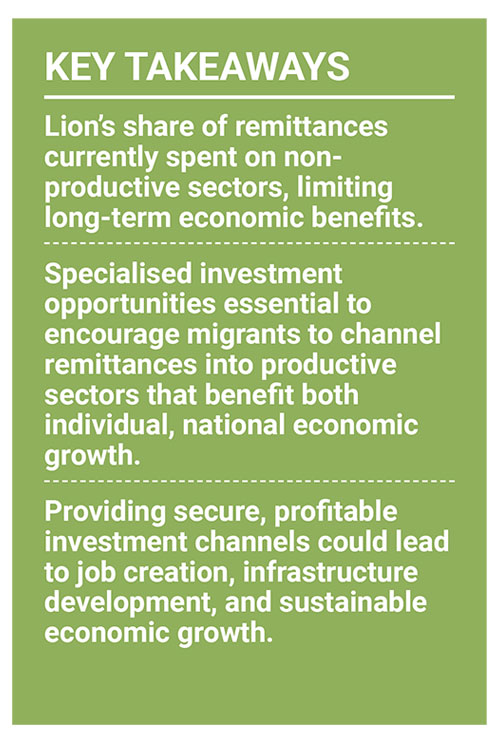Smart investments to boost remittance’s impact
Ariful Islam
Published: 27 Feb 2025

Remittances sent by migrant workers are a vital economic resource for many countries, especially Bangladesh, where a significant portion of the population depends on these funds to support their families. While remittances offer immediate economic solvency to households, experts argue that the way this money is being spent could be better structured to foster long-term economic growth of both the individual and national economy.
Currently, most of the remittance money is for non-productive activities, such as buying land or constructing homes. These expenditures, although important for family welfare, do not significantly contribute to the broader economic development of the country.
While talking to the Daily Sun, Dr Mustafa K Mujeri, executive director of the Institute for Inclusive Finance and Development (IIFD) and former chief economist of the Bangladesh Bank, highlighted the need to shift the focus of remittance spending from consumption to more productive uses.
According to Dr Mujeri, it is essential to create mechanisms that allow migrants to channel their remittances into savings and investments, which can stimulate both personal and national economic growth.

Shifting toward productive investment
Dr Mujeri explained that remittances are a crucial source of income for many families, but a large portion of these funds is not used to generate long-term wealth or economic benefits.
He also pointed out that many highly educated people who move abroad for higher studies or job opportunities often do not send remittances on a regular basis, but the migrant workers with little education are the ones who regularly send money back home. Unfortunately, much of this money is spent on immediate needs rather than on savings or investment opportunities.
"In many cases, the money sent back is used for purchasing land or building homes," Dr Mujeri said. "Such activities may improve the quality of life for a family in the short term, but they do not contribute to the country’s long-term economic growth."
Specialised investment channels essential
Dr Mujeri suggested that Bangladesh should develop specialised investment channels or industries targeted at remittance senders. By providing migrants with secure and profitable investment opportunities, the country can help these workers grow their personal wealth and at the same time channel their funds into sectors that contribute to the national economy.
"If we create the right investment opportunities for the migrants, they can invest their remittances in ventures that will benefit not only them but the broader economy as well," an economist said, emphasising that "For example, the Philippines has implemented various investment products for overseas workers, such as mutual funds and government bonds, which offer both safety and long-term returns."
By offering such programmes, Bangladesh could attract remittances into productive industries such as infrastructure, small businesses, and manufacturing. These investments could create jobs, generate economic growth, and improve the migrant workers’ financial stability.
Lucrative smart investments
Dr Mujeri proposed that if migrants had access to secure investment options, the benefits would extend beyond personal gains. Investments in productive sectors can lead to job creation, infrastructure development, and a more robust economy. Migrants would also benefit from long-term financial returns, allowing them to improve their personal financial position and contribute to the country’s growth.
"Smart investments would allow migrants to not only meet the immediate needs of their families but also play a significant role in the long-term development of the nation," he explained. "By investing their remittances wisely, migrant workers will secure their financial future while helping build a stronger, more resilient economy for Bangladesh."
In conclusion, by focusing on creating proper investment opportunities for remittance senders, Bangladesh can harness the potential of this crucial financial resource to drive long-term development. Smart investments will not only help migrants secure their financial futures but also contribute to the prosperity of the nation as a whole. By investing wisely, both migrants and the country can achieve lasting economic growth.

